India
Bulldozers in Action: Unraveling the Nagpur Violence and Key Accused Fahim Khan’s House Demolition

Contents
Introduction to the Incident
The recent violence in Nagpur has sparked significant concern and debate across various sectors of society, highlighting crucial social and political dynamics at play. The unrest erupted amid tensions between different community groups, culminating in clashes that drew widespread media attention. The events were set against a backdrop of escalating socio-political grievances, involving issues of communal relations, identity politics, and the role of governmental authority in maintaining public order.
Initial reports indicate that the conflict began with a local incident that quickly escalated, igniting long-standing tensions within the community. As rumors spread and emotions flared, groups gathered, leading to confrontations that resulted in property damage and injuries. The situation rapidly deteriorated, drawing increased law enforcement presence and prompting officials to respond with force to quell the unrest.
At the center of this violence is Fahim Khan, who has emerged as a key figure in the unfolding narrative. His house became a focal point during the unrest, leading to demands for accountability and justice from those affected by the violence. The government’s subsequent decision to demolish Fahim Khan’s residence raised further questions regarding the appropriateness of such measures in response to civil disturbances. Critics argue that the demolition was not merely a punitive action but rather a politically motivated step aimed at consolidating power and suppressing dissent.
This incident in Nagpur violence serves as a stark reminder of the fragile state of communal harmony in certain regions of India. It reflects a complex interplay of historical grievances, contemporary conflicts, and the various stakeholders’ interests, illustrating how quickly tensions can escalate into violence. As the situation continues to develop, it is clear that the repercussions of this unrest will be felt throughout the community and beyond.
Who is Fahim Khan?
Fahim Khan is a prominent figure in Nagpur, Maharashtra, whose involvement in local politics and controversies has garnered significant public attention. Born into a modest family, he navigated his early life in a challenging socio-economic environment. Over the years, Fahim built a reputation as a community leader, known for his assertiveness and ability to rally support for various local issues. His rise in the political landscape can be attributed to his connections with key political figures, which enabled him to influence local governance and community decisions.
Despite his community-oriented facade, Fahim Khan’s tenure has not been devoid of conflicts. He has had several confrontations with law enforcement in the past, primarily stemming from allegations related to land disputes and the mobilization of local youth for political activities. His confrontations often escalated into larger public incidents, generating mixed reactions among the constituents of Nagpur. This contentious relationship with law enforcement has repeatedly placed him in the spotlight, making him a figure both revered and reviled within his community.
The recent Nagpur violence further cast Fahim Khan into the national narrative as a key accused. His alleged involvement in orchestrating unrest among different community factions during the violent outburst raised significant questions about the underlying motivations driving his actions. Critics argue that he exploited prevailing tensions for political advantage, reflecting a broader trend of utilizing violence as a tool for power. This perspective invites deeper scrutiny into the intricacies of his political maneuvers and their implications for local governance and social cohesion.
As the legal proceedings unfold, Fahim Khan’s story serves as a focal point for discussions about communal relations and political accountability in Nagpur violence. Understanding his background is essential for comprehending the broader impacts of the violence and the subsequent demolition of his house, which has become symbolic of the ongoing strife.
The Role of Bulldozers in Law Enforcement
In recent years, the use of bulldozers by law enforcement agencies in India has garnered significant attention, particularly in the context of civil unrest and riots. This mechanized equipment, traditionally associated with construction and demolition, has been repurposed as an instrument of law enforcement. The underlying rationale is to deter criminal activities and signal a strong government response to public disorder. The practice is rooted in the premise that demolishing properties linked to violence can serve as a form of retribution against offenders.
The legal framework governing the use of bulldozers during such events is complex and often controversial. Authorities typically rely on existing laws relating to public disorder, land use, and urban planning to justify these actions. Although demolishing structures linked to criminal incidents is sometimes viewed as a necessary means to uphold public order, it raises important questions about the legality and morality of such actions. Critics argue that the indiscriminate use of bulldozers may infringe on individuals’ rights and due process, often disproportionately affecting the lower-income segments of society.
Bulldozers have been utilized in several high-profile cases across India, where they have been deployed in the aftermath of riots or violent protests. This technique serves multiple purposes, including the demolition of illegal constructions and the dissuasion of potential offenders. When associated with specific incidents of violence, such as the recent Nagpur riots linked to key accused Fahim Khan, bulldozers symbolize the state’s resolve to address lawlessness and restore order. However, this approach has sparked widespread debate regarding its efficacy, ethical implications, and potential for abuse, thus highlighting the delicate balance between law enforcement actions and civil liberties.
Details of the Demolition
The demolition of Fahim Khan’s house took place on a significant day marked by heightened tensions within the community. The sequence of events began shortly after the local authorities received clearance to proceed with the destruction, which was reported to be a response to his alleged involvement in the recent violence. Early in the morning, heavy machinery, including bulldozers, arrived at the site, signaling an impending action that had been a hot topic of discussion in the community and beyond.
Local media coverage ramped up as news quickly spread about the demolition. Television channels broadcast live footage, capturing the bulldozers tearing down the structure, which had been the center of much controversy. Reporters on the ground provided real-time updates, emphasizing the emotional reactions from residents who had gathered to witness the event. The media’s portrayal varied significantly; some outlets framed the demolition as a necessary step towards restoring order, while others expressed concerns about the potential for escalation of community unrest.
The local community exhibited a mix of reactions, reflecting the complex social dynamics at play. While some residents expressed approval of the demolition, viewing it as a means of accountability, others protested against what they perceived as an unjust and disproportionate response. The atmosphere was charged with conflicting opinions, and the presence of law enforcement ensured that public order was maintained throughout the event. Eyewitness accounts detail a scene filled with tension, as bystanders grappled with their sentiments regarding justice and the implications of such demolitions on community relationships.
As the demolition progressed, reactions from various stakeholders, including community leaders and activists, began to emerge. Many concerned citizens called for a more nuanced approach to addressing the underlying issues contributing to the recent violence, highlighting the need for dialogue and community engagement rather than property destruction. The bulldozers, emblematic of the state’s assertive response, left a marked impact on the local landscape, both physically and socially, as the aftermath of the demolition continued to ripple through the community.
Public Reaction and Outrage
The demolition of Fahim Khan’s house in Nagpur has sparked significant public reaction and outrage, drawing attention from various stakeholders within the community. Local residents, political leaders, and social activists have all expressed their views on the incident, underscoring the complexity of the situation and the diverse opinions surrounding it.
Many residents in the area responded with shock and dismay, arguing that the demolition was an excessively harsh punishment for the alleged actions of one individual. This sentiment has been echoed widely on social media platforms, where discussions surrounding justice and due process have gained traction. Individuals have voiced concerns over the potential implications such actions might have on community trust in law enforcement and the judicial system. Proponents of due process argue that demolishing a person’s residence could set a dangerous precedent, undermining the fundamental principles of justice.
Conversely, some members of the community and political leaders contend that the demolition was necessary to uphold law and order. They argue that such measures serve as a deterrent against unlawful behavior, especially in light of the violent events associated with Khan. These voices highlight a segment of society that perceives immediate and stringent actions as essential for restoring peace and safety in the community.
Social activists have taken a particularly vocal stance, advocating for the protection of civil liberties and questioning the legality of the demolition. They emphasize the need for a balanced approach, calling for comprehensive investigations into the violence rather than widespread punitive actions that affect family members and the local community at large. Overall, the varied reactions to this incident reflect broader societal sentiments regarding justice, law enforcement, and the fine line between maintaining order and respecting individual rights.
Legal Ramifications for Fahim Khan
The recent violence in Nagpur, which has garnered significant media attention, has placed Fahim Khan, a key accused, at the center of legal scrutiny. The charges Khan may face are manifold and could potentially range from public disorder and rioting to more severe accusations, such as inciting violence and conspiracy. In the wake of the unrest, law enforcement authorities are tasked with determining the extent of his involvement, which will heavily influence the legal proceedings against him.
One of the critical aspects of this situation is the decision to demolish Khan’s residence. This action, although framed as a response to the violence, has broader implications for his legal standing. The demolition can be perceived as a punitive measure, raising questions about the due process and legality of such an action. In many jurisdictions, property destruction without due judicial process can complicate the legal landscape, especially if it can be argued that it undermines the principles of fair trial and presumption of innocence.
The charges that Khan faces could also severely affect his defense strategy. With the demolition of his home, key evidence and personal belongings might be lost, potentially hampering his legal counsel’s ability to build a robust case. Furthermore, public sentiment may have shifted against him due to the associated violence, complicating matters further as the prosecution might leverage this sentiment in their arguments. The legal ramifications of the course of events will not only shape the immediate proceedings but could also have lasting impacts on Khan’s future, affecting potential sentencing and his civil rights.
Comparative Analysis of Similar Cases
In addressing the recent violence in Nagpur associated with the key accused, Fahim Khan, it is crucial to examine comparable incidents across India where authorities employed demolitions as a punitive response. Such actions often evoke public debate over the balance between law enforcement and civil liberties.
One notable example occurred in Uttar Pradesh in 2022, where the properties of individuals alleged to be involved in communal riots were demolished. Authorities justified these actions by framing them as a necessary deterrent against future violence. However, critics argued that such measures disproportionately impact the accused and their families, raising concerns about the legality and ethics of demolishing homes without thorough judicial processes.
Another incident in Madhya Pradesh highlighted similar patterns. Following clashes during a festival, officials ordered the demolition of properties linked to suspects. Local government statements often emphasized the need for swift action to uphold public order. Yet, this approach has led to accusations of targeting minorities and selective enforcement, which further complicates the narrative surrounding justice and accountability.
The Nagpur situation reflects these broader trends, wherein demolitions serve as an extension of state power in response to violence. Authorities may perceive this as a means to restore order, but the implications extend beyond physical structures; they impact families and communities, often perpetuating cycles of fear and resentment. Evaluating Shaikh Fahim’s case alongside these incidents reveals recurring themes: the interplay of law enforcement tactics, societal pressures, and the critical discourse surrounding human rights.
As tensions mount in such scenarios, the legal frameworks guiding these demolitions warrant careful scrutiny to ensure they align with principles of justice and due process, striking a balance between maintaining public order and safeguarding individual rights.
Impacts on the Local Community
The recent violence and subsequent demolition of Fahim Khan’s house in Nagpur have reverberated throughout the local community, leaving lasting impressions both socially and economically. The events surrounding the violence fueled a climate of fear and uncertainty, particularly among residents who share similar backgrounds. Many in the neighborhood expressed feelings of vulnerability, worrying that they too could be subjected to similar actions regardless of their actual involvement. This erosion of trust among community members significantly affects social cohesion, fostering an environment where individuals may distrust their neighbors and feel isolated.
Economically, the fallout from this turmoil cannot be ignored. The local businesses that were already struggling due to the pandemic now face additional threats as customers fear visiting areas associated with violence. Business owners have reported declines in foot traffic, resulting in decreased revenue and job insecurity for employees. Furthermore, the demolition of property raises perfect questions regarding property rights and security, leading to broader concerns about investment in the area. Potential investors may be deterred by the perceived instability, thus hindering economic growth and development in Nagpur.
Also read : Political Maneuvers: MK Stalin Hosts Opposition Meet Amid BJP’s Criticism
The psychological toll on residents is profound, as witnessing such events can lead to heightened stress and anxiety levels. For families with children, concerns about safety loom larger than ever, impacting their quality of life. Many have reported increased instances of sleeplessness and fear, affecting daily routines and relationships. This collective trauma may lead to long-term psychological effects that necessitate community support and comprehensive mental health services to aid in recovery.
In summary, the violence and demolition associated with Fahim Khan’s case extend far beyond the immediate actions, significantly impacting the local community in Nagpur. The repercussions can be seen across social, economic, and psychological dimensions, highlighting the critical need for community solidarity and recovery initiatives.
Looking Forward: The Future of Law and Order in Nagpur
The recent violence in Nagpur and the subsequent demolition of Fahim Khan’s house have raised significant concerns regarding law enforcement practices and community safety in the region. As authorities analyze this incident, it is imperative to consider reforms that could enhance law and order while preventing similar occurrences in the future.
One crucial aspect of improving law enforcement is the implementation of community engagement strategies. Establishing strong relationships between law enforcement agencies and local communities can foster trust and cooperation. Initiatives like community policing, where officers collaborate with residents to address local issues, can help identify potential conflicts before they escalate. By involving community members in decision-making processes and ensuring their voices are heard, law enforcement can create a more harmonious environment.
Furthermore, training and equipping law enforcement personnel to handle such situations more effectively is critical. Emphasis should be placed on conflict resolution and negotiation skills, allowing officers to de-escalate volatile situations without resorting to force. Regular workshops and training sessions can prepare officers to engage with diverse communities sensitively, understanding the cultural contexts that may influence individual behavior and community dynamics.
Local governance must also play a pivotal role in preventing future incidents. Policies that promote transparency and accountability within law enforcement agencies are of utmost importance. Establishing independent oversight committees can ensure that police actions are monitored, particularly in high-tension situations. These committees can help restore public confidence in the law enforcement system, ensuring it serves the community effectively and justly.
In summary, the implications of the Nagpur violence extend beyond immediate consequences. They offer an opportunity to reevaluate and strengthen law enforcement strategies, emphasizing community engagement and accountability. Through careful consideration and implementation of reforms, Nagpur can work towards a safer future and mitigate the likelihood of similar incidents occurring again.
Crime
Vandalism by Kanwariyas in Meerut: School Bus Attacked, FIR Registered
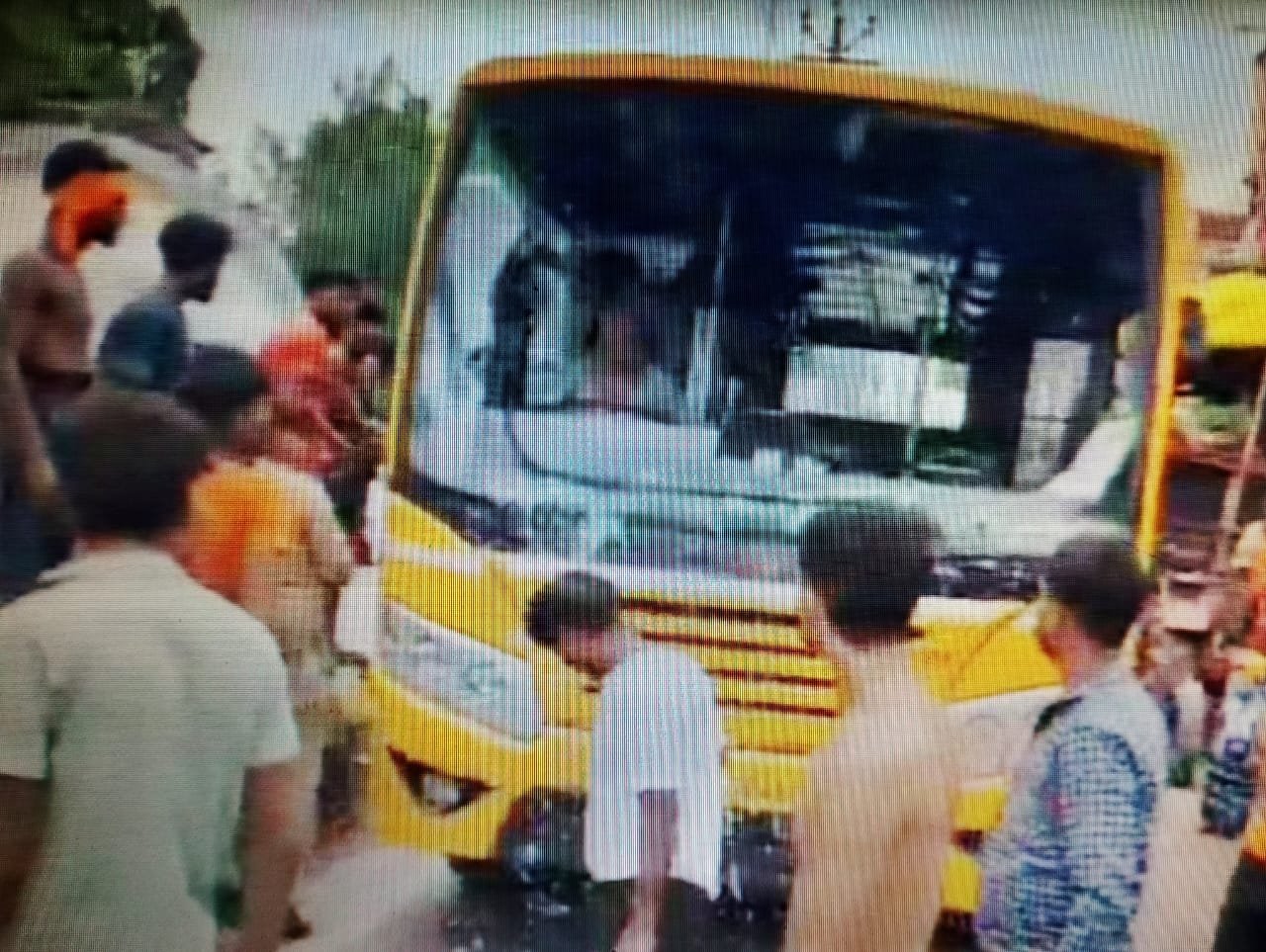
Contents
Meerut, July15,2025
Tension flared in Meerut’s Sadar Bazar area after a group of Kanwariyas allegedly vandalized a school bus during the annual Kanwar Yatra. The incident occurred on Monday, July 14, prompting swift police action.
According to the complaint filed by Sub-Inspector Gaurav Kumar, 4-5 unidentified youths got into an argument with the bus driver. The confrontation escalated quickly, with the accused allegedly hurling abuses, issuing death threats, and smashing the bus windows.
Upon receiving the alert, police rushed to the spot and found the bus in a damaged condition, surrounded by a large crowd.
Bus Windows Shattered by Kanwariyas
Confirming the incident, Circle Officer (CO) Santosh Kumar of Meerut Cantonment said the police had been informed about a scuffle involving a group of youths and the bus driver. “They had broken the windows of the bus. We immediately reached the spot and ensured the safety of both the driver and the vehicle,” he stated.
FIR Lodged, Investigation Underway
A case has been registered under various sections of the Bharatiya Nyaya Sanhita (BNS), and efforts are on to identify the culprits through video footage. Officials have assured that strict legal action will be taken against those found guilty.
India
A Milestone Towards Gaganyaan: PM Modi Welcomes Group Captain Subhanshu Shukla After Historic Space Mission

New Delhi, July15,2025
Prime Minister Narendra Modi has lauded Group Captain Subhanshu Shukla for his successful return from space, calling it a proud moment for the nation and a significant step toward India’s ambitious Gaganyaan mission.
Taking to social media, PM Modi wrote,
“I join the entire nation in welcoming Group Captain Subhanshu Shukla as he returns to Earth from his historic space mission. As the first Indian to visit the International Space Station, Subhanshu has inspired millions with his dedication, courage, and pioneering spirit. This marks another milestone on the path toward our own human spaceflight mission – Gaganyaan.”
“Touching the skies, lifting India’s dreams”
Defence Minister Rajnath Singh also expressed pride over the successful completion of the Axiom-4 mission. In a heartfelt social media post, he wrote:
“Group Captain Subhanshu Shukla’s successful return from the historic Axiom-4 mission is a moment of immense pride for every Indian. He has not only touched space but has elevated the dreams of India to new heights.”
Singh further emphasized that Subhanshu’s journey to and from the International Space Station is not merely a personal achievement but a major stride in India’s expanding space ambitions.
“I pray for his continued success in all future endeavors,” he added.
Subhanshu Shukla’s mission marks a new chapter in India’s space exploration story, strengthening the country’s position on the global stage and inspiring the next generation of Indian astronauts.
Crime
Tension in Jaipur’s Ramganj Area After Alleged Harassment Incident Sparks Stone-Pelting Between Communities
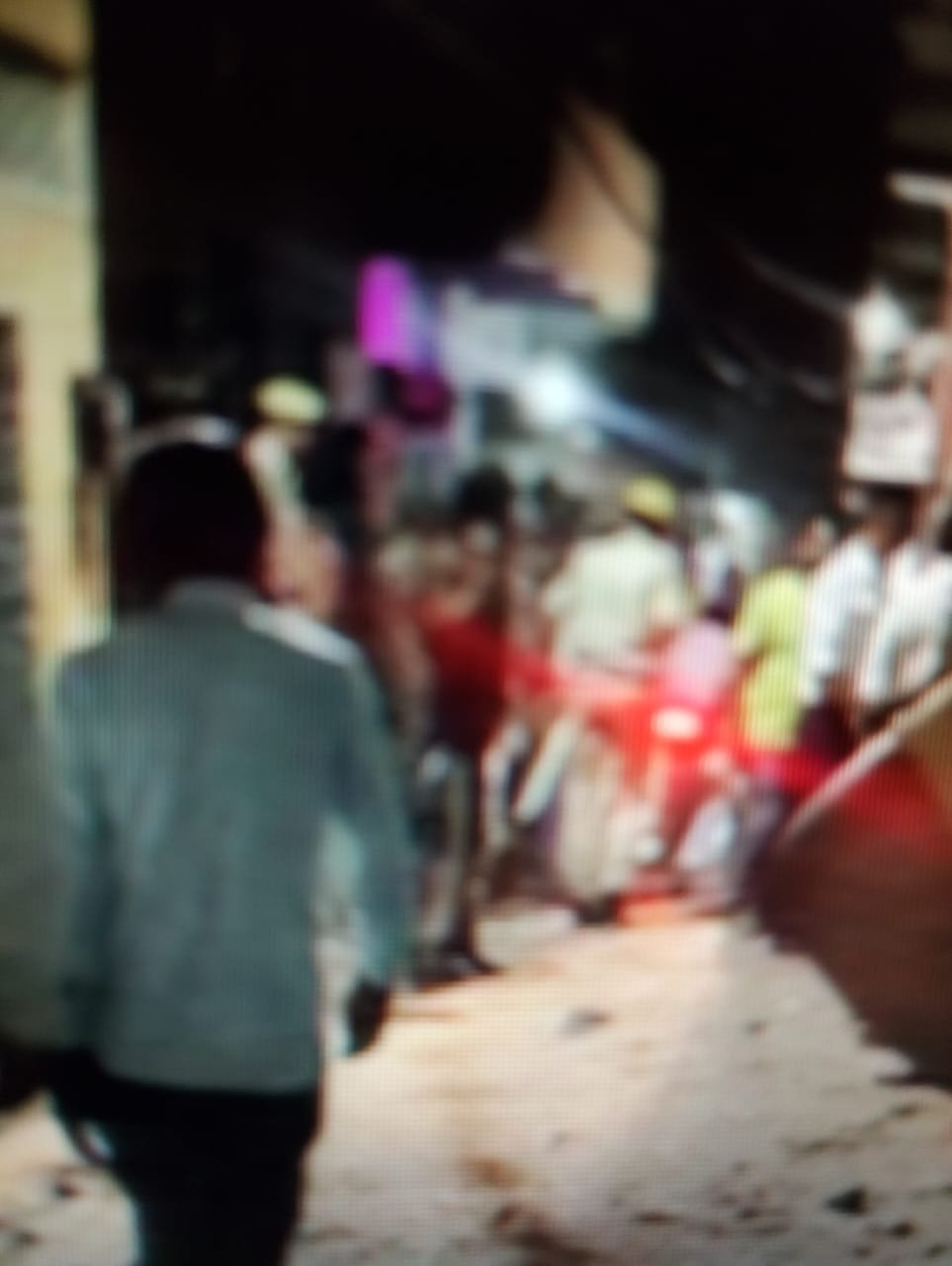
Contents
Jaipur, July 15,2025
Tension gripped the Ramganj area of Jaipur on Saturday after an alleged incident of harassment involving a woman escalated into a violent clash between two communities. The confrontation, which began as a verbal dispute, quickly turned into stone-pelting, causing panic in the neighborhood.
The incident occurred in the Babu Ka Tika locality, a part of Ramganj known for its sensitive history. According to eyewitnesses, a few young men from one community allegedly misbehaved with a local woman. When members of the other community confronted them, the situation escalated rapidly. What started as an argument soon turned into chaos, with both sides hurling stones at each other.
Several people were reportedly injured in the clash, although the police have not yet released an official statement regarding the number or severity of the injuries. Locals also reported damage to nearby shops and vehicles, adding to the fear and anxiety in the area.
Police forces rushed to the scene as soon as the incident was reported. To prevent further escalation, additional security personnel were deployed, and patrolling has been intensified throughout the neighborhood. The situation is currently under control, but authorities are maintaining a heightened security presence in the area as a precaution.
Ramganj is considered one of Jaipur’s most densely populated and communally sensitive areas, with a history of similar tensions. Given the seriousness of the incident, the police have launched a full investigation. CCTV footage from the area is being reviewed to identify those involved in the violence.
Officials have assured that strict action will be taken against anyone found responsible. The local administration has urged residents not to pay heed to rumors and to maintain peace. Authorities emphasized that no one will be allowed to disturb law and order under any circumstances.
Andhra Pradesh
Andhra Pradesh: Class 9 Student Dies After School Fight with Classmate in Bobbili
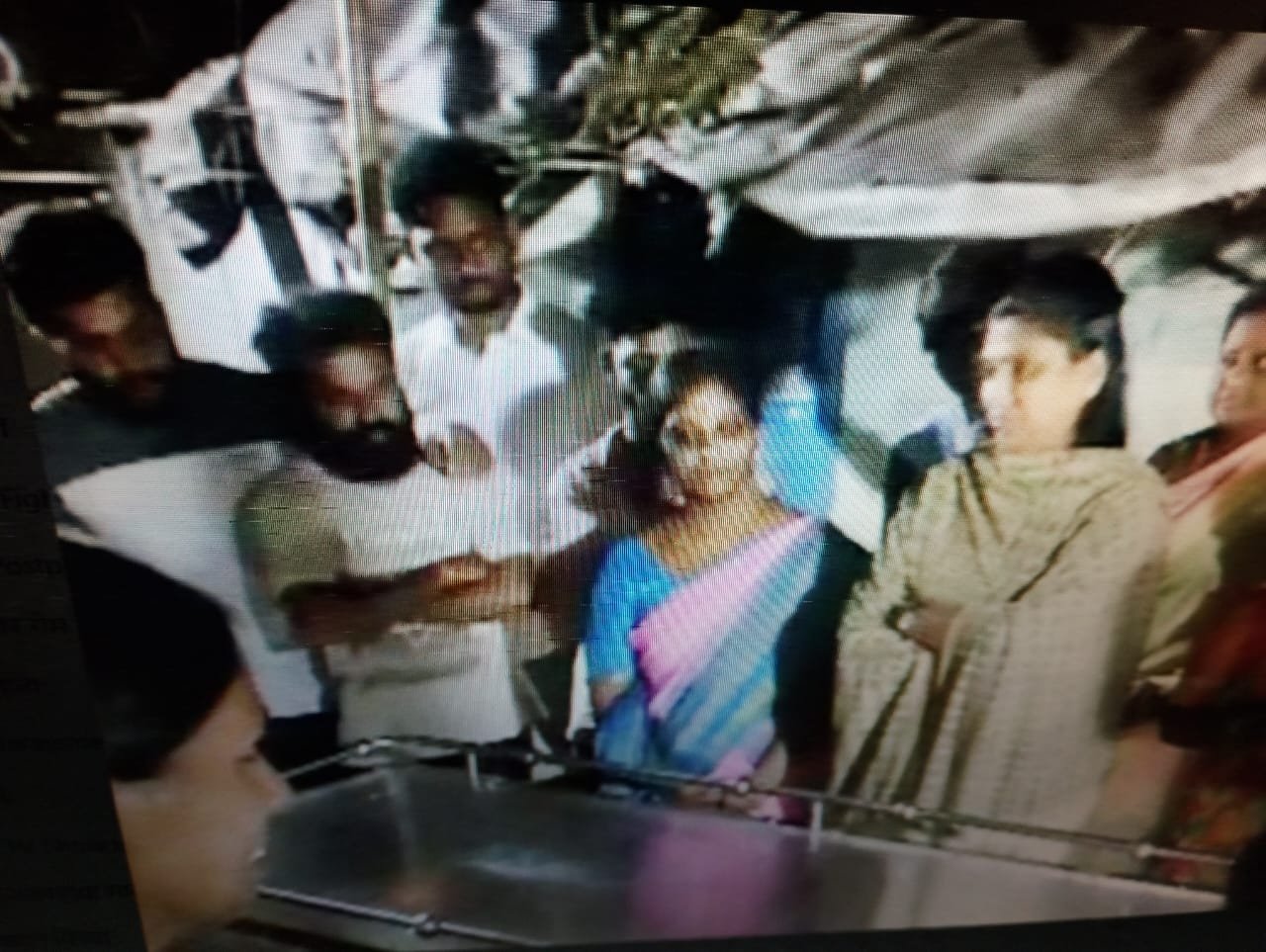
Andhra Pradesh, July15,2025
In a tragic incident from Bobbili town in Andhra Pradesh, a 14-year-old Class 9 student died after a scuffle with a classmate moments after school got over. The boy, identified as Sundarada Karthik, reportedly got into a fight near the Bobbili Fort, where he was punched by his classmate, collapsed, and later succumbed to his injuries at the hospital.
According to police sources, Karthik, a resident of Ravu Gari Street and a student of Class 9, frequently argued with a fellow classmate over petty issues. Their rivalry had been escalating for some time.
On Monday, just after the school had closed for the day, the two boys reportedly encountered each other again near the Bobbili Fort. According to eyewitness accounts and police reports, Karthik allegedly provoked his classmate and challenged him to a fight. The argument quickly turned physical. During the altercation, the other boy is said to have punched Karthik, who fell unconscious on the spot.
He was immediately rushed to a nearby hospital, but doctors declared him dead on arrival.
The incident has shocked the local community and raised concerns about rising aggression among schoolchildren. Police are investigating the matter and questioning witnesses to determine the exact sequence of events.
Crime
Death Sentence of Indian Nurse Nimisha Priya Postponed, Major Update from Yemen

Yemen, July 15,2025
In a major relief, the execution of Indian nurse Nimisha Priya has been postponed, according to sources. Nimisha, who hails from Kerala, was scheduled to be hanged in Yemen on July 16. The latest reports suggest that a significant development has taken place, temporarily halting the sentence that had sparked international concern.
Nimisha’s case has drawn widespread attention and emotional appeals from across India and the global Indian community. The postponement has brought a moment of hope for her family, well-wishers, and the many people who have been campaigning tirelessly for her life to be spared.
Crime
Odisha: Student Who Accused College Professor of Sexual Harassment Dies by Suicide, Father Alleges She Was Pushed to Take Extreme Step
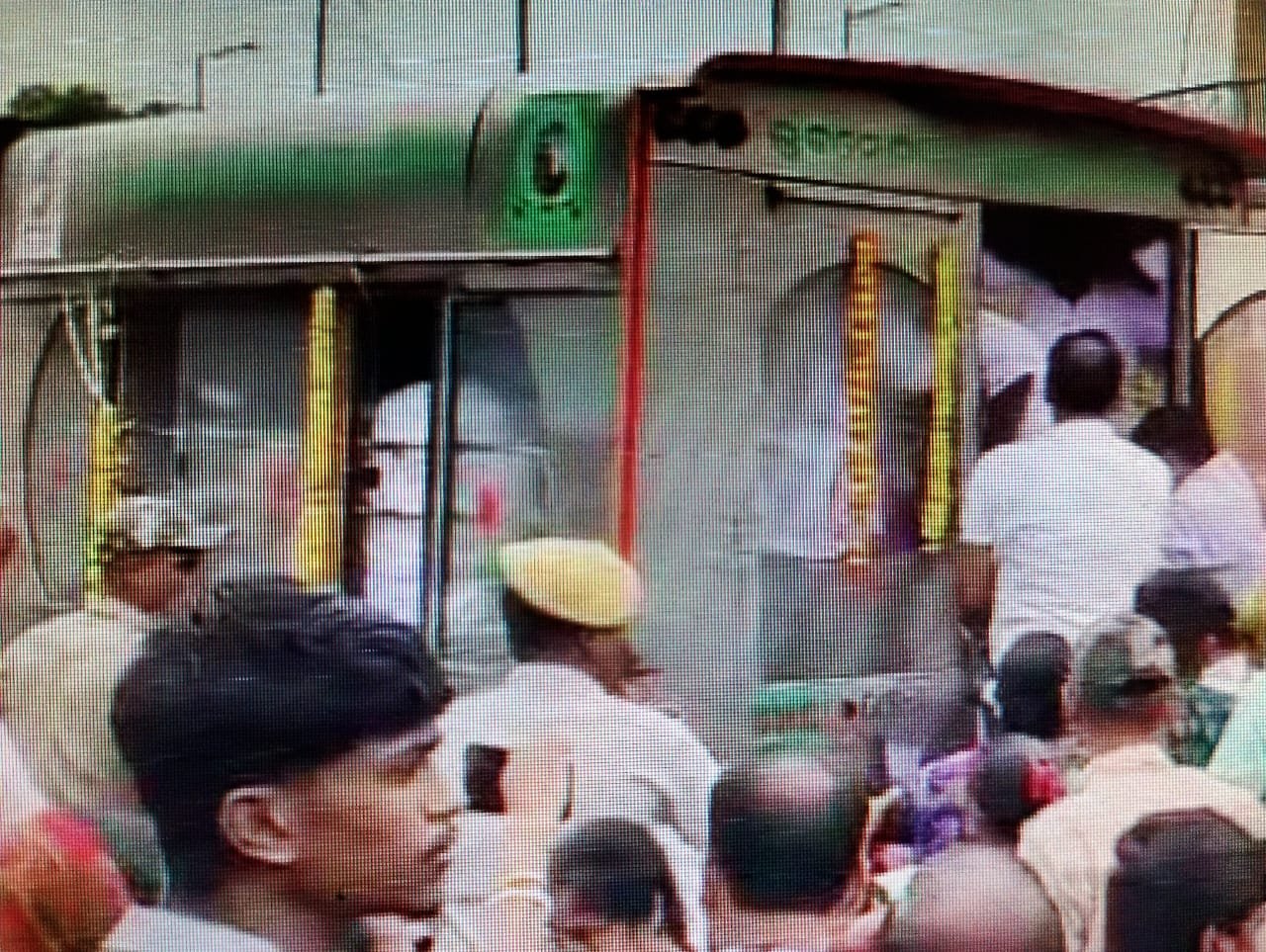
Odisha, July15,2025
Bhubaneswar, Odisha – A college student who had attempted suicide after alleging inaction on her sexual harassment complaint has died while undergoing treatment at AIIMS Bhubaneswar.
The student had accused the Head of Department at Fakir Mohan College in Balasore of sexually harassing her. She took the drastic step on Saturday, allegedly due to frustration over the lack of appropriate action on her complaint. Following the attempt, she was admitted in critical condition to AIIMS Bhubaneswar, where she later passed away.
The student’s father has now come forward with serious allegations against the internal inquiry committee, claiming that their mishandling and a deliberately misleading report forced his daughter into taking her own life.
Speaking to the media, he said, “We are seeking justice. Merely arresting two individuals won’t suffice. My daughter was mentally tortured and pushed to the edge. The internal committee members are equally responsible. I request the government to take the strictest possible action against them.”
The case has sparked widespread outrage and calls for a thorough and transparent investigation into how the college handled the complaint and whether the internal committee was complicit in suppressing the matter.
As the family mourns their irreparable loss, voices demanding accountability grow louder, raising critical questions about institutional response to sexual harassment complaints in educational institutions.
Crime
Principal Arrested After Student’s Suicide Attempt in Odisha College Over Sexual Harassment Complaint
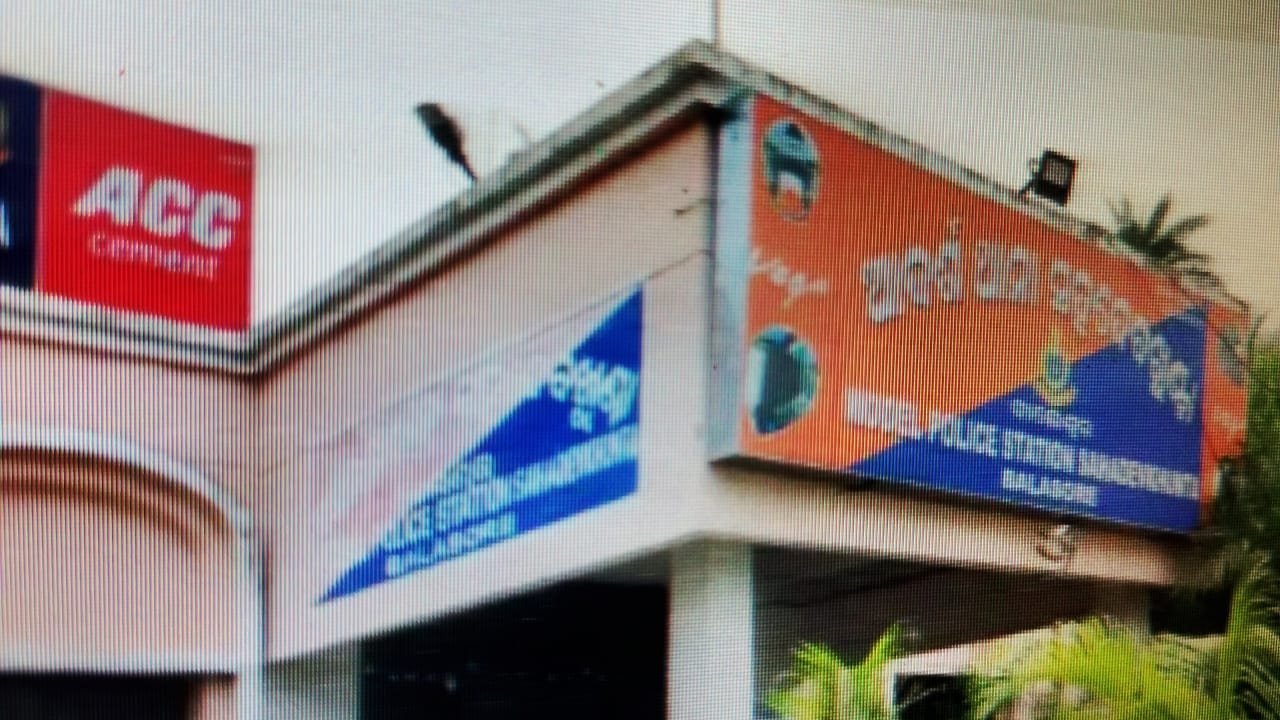
Odisha, July 14,2025
In a shocking development from Balasore, Odisha, the principal of Fakir Mohan College, Dilip Kumar Ghosh, has been arrested by Sahadevkhunta Police following a student’s suicide attempt on campus.
The arrest comes after a female student of the college allegedly attempted suicide on Saturday, accusing a faculty member of sexual harassment. The student is currently in critical condition and receiving treatment at AIIMS Bhubaneswar.
Confirming the arrest, Balasore Superintendent of Police, Raj Prasad, told BBC that the principal was taken into custody for his alleged negligence in handling the student’s repeated complaints.
According to the victim’s family, the girl had been subjected to ongoing sexual harassment for several months. Despite lodging a formal complaint with the college authorities, no meaningful action was taken. Frustrated and distressed by the college’s inaction, the student reportedly attempted to take her own life.
The family had been demanding the arrest of the principal, alleging that he failed to take timely and appropriate action. They also accused the college’s internal inquiry committee of trying to protect the accused teacher, instead of supporting the victim.
Earlier, the police had arrested the Head of the Department (HoD) of the Education Department, Sameer Kumar Sahu, who is the prime accused in the sexual harassment case.
On Sunday, Odisha Chief Minister Mohan Charan Majhi addressed the issue, stating,
“An investigation is underway to understand the full circumstances of the incident. The government will ensure strict action is taken against those responsible.”
The incident has sparked widespread outrage, highlighting the urgent need for stricter enforcement of sexual harassment protocols within educational institutions.
Environment
Literature and Environment Are Both Sources of Sensitivity”Tree is Life: Grand Celebration of ‘Ek Ped – Sampark Ke Naam’ and Poetry Recitation on Environment
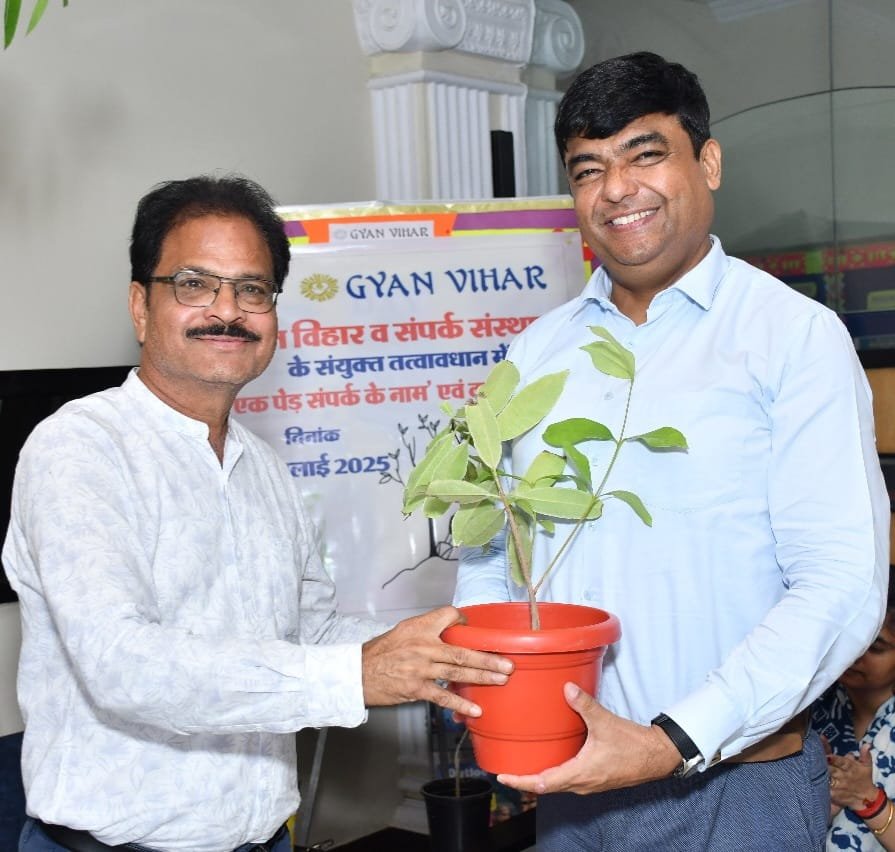
Jaipur, July 14,2025
A Heartfelt Environmental and Literary Initiative by Sampark Sansthan Receives Overwhelming Response at Gyan Vihar School Campus Jaipur.
The joint initiative of Sampark Sansthan and Gyan Vihar School, titled ‘Ek Ped – Sampark Ke Naam’, along with an environmental poetry recital, turned out to be a meaningful confluence of ecological awareness and literary sensibility. Students, teachers, poets, and social workers participated in the event with deep enthusiasm and emotional engagement.
Welcoming everyone, Sampark Sansthan President Anil Ladha remarked,
“This is not just an event, it’s an attempt to connect life and society through tree plantation. We want every individual to nurture a tree as lovingly as they would nurture a relationship.”
Dr. Ritvij Gaur (Principal), present as a special guest, emphasized in his speech,
“Trees are the foundation of our culture and survival. Teaching children to emotionally connect with nature through tree planting is the need of the hour.”

Sampark Sansthan General Secretary and Coordinator Renu ‘Shabdmukhar’ touched hearts with her words,
“This initiative aims to instill in students a sense of responsibility and the spirit of coexisting with trees. When nature and poetry walk together, society becomes truly awakened.”
Veteran poet Prof. Prabodh Govil inspired the audience, stating,
“Literature and environment are both profound sources of human sensitivity.”
Renowned writer Dr. Jayshree Sharma added,
“Trees don’t just give us oxygen, they teach us life values. A poem, a plant, and a thought — these can together change the world.”
Inspiring the young generation, senior poet Anshu Harsh quoted,
“When you walk ahead, many will follow.”
Usha Rastogi’s positive presence brought an energetic vibe to the event.
Program Coordinator Himadri Samarth expressed that,
“No matter what name we give to the campaign, the aim remains the same – to protect the environment.”
He concluded by thanking all the distinguished guests for their participation and support.
The event was beautifully hosted by Seema Walia, whose graceful voice, articulate language, and emotional tone left a lasting impact on everyone present.
The active participation of Gyan Vihar students made the event truly vibrant. When tiny hands touched the soil and planted saplings, it was more than an activity — it became a symbol of emotional bonding with nature.
Students like Charul, along with senior poets — Dr. Neelam Kalra, Renu Shabdmukhar, Himadri, Dr. Kanchana Saxena, Sonal Sharma, Dr. Anju Saxena, Avinash Joshi, Dr. Punita Soni, Kavita Mathur, S. Bhagyam, Rao Shivraj, Dr. Deepali, Vijayalakshmi, Sushila Sharma, Sushma Sharma, Meena Jain, Mahesh Sharma, and Nisha Jha — delivered powerful poetic performances centered on environmental consciousness. The students not only listened but also absorbed the essence of literature as a tool for raising awareness about nature.
The event sent a strong message — if the young generation connects with nature today, the future will be safe, beautiful, and full of hope.
Art
Sattva, Rajas, Tamas” Come Alive on Canvas – Dr. Renu Shahi’s Indian Philosophical Art Shines in Sri Lanka

Colombo/Jaipur, July 14,2025
In a vibrant celebration of artistic expression and cultural wisdom, Indian artist Dr. Renu Shahi has drawn deep admiration for her spiritually inspired paintings at an international art exhibition titled “Uncharted”, held at the Curado Art Space in Colombo, Sri Lanka.
Organized by the Rainbow Art Group, New Delhi, this cross-border exhibition featured 49 contemporary artists from six countries, each offering their unique visual interpretations. Amid this diversity, Dr. Shahi’s works stood out — not only for their aesthetic depth but also for their philosophical grounding.
Her three paintings, inspired by verses from the Bhagavad Gita, revolved around the three fundamental qualities of human nature: Sattva (purity), Rajas (passion), and Tamas (inertia). Through rich symbolic imagery and subtle layering, she represented these gunas not merely as abstract ideas, but as divine forces shaping the human experience. Each artwork intertwined color, mythology, and introspection into a single visual meditation.
The exhibition, which ran from July 4th to 10th, was inaugurated by Shanila Alles, Director of Curado Art Space, and curated by Virendra Kumar, the visionary founder of Rainbow Art Group. The group’s mission is to highlight artists who explore Indian culture, spirituality, and heritage through their canvas, offering them a global stage to be seen and heard.
“For us, art is a language that speaks beyond words,” said Kumar. “It transcends geography and unites minds — whether you’re from Jaipur or Jakarta.”

Alongside Dr. Shahi, notable artists such as Banita Rani Singh, Bhaskar Ghosh, Dr. Chetna Agarwal, Manju Saad, Manoj Chakravarty, and Nayana Mevada, among others, showcased their works. Artists hailed not just from India but also from Nepal, Sri Lanka, Qatar, Indonesia, and Belarus. Each piece was a window into the artist’s soul — and some of those windows were so captivating that a few artworks were sold, a testament to the audience’s deep connection with the themes.
Rainbow Art Group has, over the years, emerged as a powerful platform nurturing both emerging and established talent. Its exhibitions reflect a belief that “art needs no passport — it is the purest dialogue between cultures.”
Dr. Renu Shahi’s series served not just as paintings, but as philosophical experiences — introducing Sri Lankan viewers to the timeless teachings of Indian scriptures, not through sermons, but through strokes of color, layers of thought, and a visual silence that speaks louder than words.
Crime
Don’t Hang Nimisha Priya in Yemen: Supreme Court to Hear Plea Today Seeking Diplomatic Intervention to Save Kerala Nurse

Contents
New Delhi, July14,2025
The life of Indian nurse Nimisha Priya, who has been sentenced to death in Yemen, hangs by a thread. With the execution scheduled for July 16, her family and well-wishers are making desperate last-minute efforts to save her.
Today, the Supreme Court of India will hear a critical petition filed by the Save Nimisha Priya International Action Council, urging the Indian government to step in diplomatically and prevent her execution. The matter will be taken up by a bench comprising Justice Vikram Nath and Justice Sandeep Mehta.
What is Nimisha Priya Accused Of?
According to Yemeni court documents, Nimisha, who has been living in Yemen since 2008, was accused of murdering her business partner Talal Abdo Mahdi. Reports allege that after the murder, she, along with another nurse, dismembered his body and disposed of the remains in a water tank.
However, Nimisha’s family strongly denies the murder charges. They claim that Nimisha did not intend to kill Talal. According to them, she only administered an injection to render him unconscious so she could retrieve her confiscated passport. Tragically, due to an overdose, he died — making it an accidental death, not murder.
Pleas for Mercy Rejected
In a heartbreaking turn of events, Nimisha had earlier filed an appeal against the death sentence in Yemen’s Supreme Court, but it was rejected. She also made a mercy plea to the President of Yemen, which too was denied.
A Mother’s Last Hope
Nimisha’s family has made multiple appeals for help — reaching out to both Kerala Chief Minister Pinarayi Vijayan and the central government. CM Vijayan personally wrote to Prime Minister Narendra Modi, urging him to intervene and use all diplomatic channels possible to halt Nimisha’s execution.
The Ministry of External Affairs (MEA) has stated that it is doing all it can to provide support to Nimisha’s family and is in touch with relevant authorities.
Why This Case Matters
This is not just a legal case; it’s a human story of desperation, fear, and a plea for compassion. A mother, a nurse, an Indian citizen – Nimisha Priya is facing death in a foreign land. Her family is fighting to give her a second chance, hoping that diplomacy and humanity will prevail where legal appeals have failed.
As the clock ticks towards July 16, all eyes are now on the Supreme Court of India and the Indian government — will they act in time to stop the execution and bring Nimisha home alive?
Nimisha Priya, Yemen death penalty, Indian nurse, diplomatic intervention, Supreme Court India, Save Nimisha Priya campaign, Kerala news, Talal Abdo Mahdi, Pinarayi Vijayan, Narendra Modi

 Education1 month ago
Education1 month agoKota ICICI Bank Staffer Swindles ₹4.5 Crore, Gambles It All on Stock Market

 Bollywood1 month ago
Bollywood1 month agoHousefull 5 Movie Review: Akshay Kumar, Riteish Deshmukh Bring Laughter and Twists in Bollywood’s Biggest Comedy Franchise

 Education3 weeks ago
Education3 weeks ago11 Powerful Reasons Why DAV International Yoga Day Jaipur Uplifted Spirits!

 Cricket1 month ago
Cricket1 month agoBengaluru Chinnaswamy Stadium Stampede: 11 Dead, 33 Injured in RCB Victory Parade Chaos

 Education3 weeks ago
Education3 weeks ago7 Inspiring Highlights of DAV Foundation Day Jaipur Celebration – Amazing Vedic Legacy Revealed!

 Education2 weeks ago
Education2 weeks agoEmpowering Educators: A Three-Day Learning Journey at DAV Centenary Public School, Jaipur

 Credent TV3 weeks ago
Credent TV3 weeks agoVIBGYOR Summer Camp Ends on a High at DAV Centenary Public School, Jaipur

 Election1 week ago
Election1 week agoDAV Centenary Public School, Vaishali Nagar, Jaipur Event Report: Talent Hunt Show
































